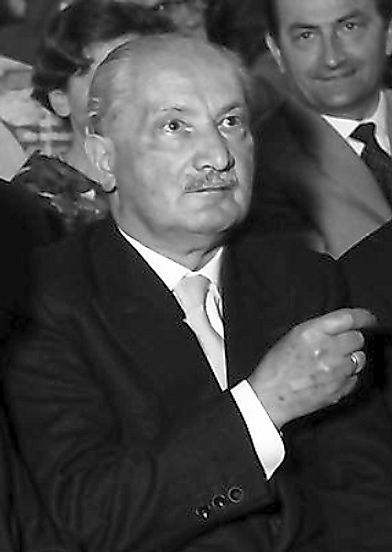
The Controversial Philosophy Of Hannah Arendt
One of the most controversial but important philosophers of the 20th century is Hannah Arendt. Known for her work on totalitarianism, Arendt has had a lasting influence on political philosophy. She specifically looked at the nature of evil and the human condition. Her work discusses the misconception that evil takes on a villainous form. Instead, Arendt believes that what we consider evil is usually quite ordinary. Here we explore who Hannah Arendt was and what makes her philosophy so controversial.
Early Life

Hannah Arendt was born in 1906 in Hanover Germany. Early on in her life, Arendt faced hardship. Her father died when she was seven from syphilis. Arendt's mother raised her in a politically progressive household as a secular Jew. Her mother was passionate about politics and a Social Democrat, which might have inspired Arendt's own love of politics.
Arendt completed her secondary education in Berlin. Later, she studied philosophy at the University of Marburg under philosopher Marin Heidegger. She even had a brief love affair with Heidegger. However, when he joined the Nazi party in the years prior to World War Two, Arendt ended their relationship. Arendt continued her studies and obtained her doctorate in philosophy at the University of Heidelberg in 1929. As Berlin became increasingly hostile, Arendt fled the country. Following the Nazi takeover of Germany in 1933, Arendt settled in France, where she lived for the next seven years.
Moving to America

As Nazi rule spread and war broke out in Europe, Arendt decided to move to the United States. In 1941, she moved to New York where she made significant contributions to the analysis of totalitarian systems.
Arendt's motivation to study totalitarianism came partly from her past experiences. She wanted to understand how intelligent people, such as her past teacher and lover Heidegger, could believe in Nazi propaganda. Arendt's work in political philosophy is some of the most perceptive and controversial in the field. Today, her work is still drawn on for people looking to analyze totalitarianism.
The Trial of Adolf Eichmann

When Arendt moved to New York, she covered the trial of war criminal Adolf Eichmann, a high ranking Nazi German official and war criminal. During the Holocaust, he helped with the systematic mass murder of European Jews. Eichmann himself organized the deportation of more than 1.5 million Jews from across Europe to be killed in special camps.
Covering Eichmann's trial, Arendt was absolutely disturbed. She expressed her thoughts about the trial in her report for the New Yorker, which appeared later in her book Eichmann in Jerusalem: A Report on the Banality of Evil.
The report showed Arendt's controversial take on the trial. While the media portrayed Eichmann as a terrible monster, Arendt's view was that he was just a "terrifyingly normal" bureaucrat. Eichmann was able to carry out his role not because of an abhorrent and twisted mind, but because he wanted to further his career within the regime. He was so focused on climbing up the political ladder that he never considered the consequences of his actions from anyone else's perspective.
In Arendt's view, Eichmann's actions were not defined by malicious thought. Instead, he had an absence of thought. This was the backbone for Arendt's idea of the "banality of evil."
The Banality of Evil

The "banality of evil" is the idea that evil is not something malicious and villainous exclusive to select people. Instead, Arendt defines evil as an idea brought out when immoral principles become normal over time. Specifically, this occurs when people focus solely on their own perspective. When people stop thinking about situations from the point of view of others, they act more immorally. This makes ordinary people perpetuate a cycle of immoral actions.
The banality of evil is also possible because of how important social and cultural relations are. Social and cultural relations influence the way we think and behave. Sometimes this is on a level people aren't even conscious of. People only really become aware of social and cultural relations when someone doesn't conform to them.
Implications

If evil is as Arendt describes it, this means we have to be careful of what our societal norms are. Otherwise, evil principles could emerge to become the new normal. At the time when Arendt published her report, this idea was controversial. The banality of evil implied a group of purely terrifying, evil men were not to blame for the horrific crimes committed in Nazi territory. While these men were responsible for kickstarting the war, it was ordinary people who sustained it and society that enabled it. Arendt believed a lack of critical thinking was to blame for the horrors of World War 2. In other words, society enabled Nazi Germany to continue its crimes. In this view, genocide can occur anywhere and at any time with the wrong societal norms in place.
Controversy and Defenders

While some people celebrated Arendt for her work and introduction of new political theories, others accused her of attacking the Jewish community. A group of Holocaust survivors believed Arendt's idea undermined their suffering during the Holocaust. They claimed that her portrayal of Eichmann as a normal, thoughtless person was a way to absolve him of any responsibility for his actions. Arendt also faced criticism for discussing the compliance of Jewish leadership groups with the Nazi party's orders of deportation. Some people saw Arendt's criticism as blaming Jewish people for not fighting back harder against Nazi violence.
While Arendt's philosophy has faced criticism, Arendt also has some avid supporters. Some people believe that Arendt faces criticism because of societal sexism since her work was often criticized as too "emotional." Others believed Arendt was a "self-hating Jew." This criticism is often rebutted with the fact that curiosity and questioning are an important part of Jewish culture. Some people also believe that Arendt was not blaming the Jewish leadership for their compliance with Nazi orders. Rather, she was showing a high respect for the Jewish community by condemning submissiveness during the Holocaust.
Takeaways From The Banality of Evil
Whether you agree with Arendt's ideas or not, her 1963 book, A Report on the Banality of Evil, remains a relevant read. The book delves into important ideas about the human condition and suggests we think carefully about our societal norms. There are several takeaways from Arendt's philosophy that can benefit everyone. The first one is the importance of reflection on our moral standards. By reflecting on our moral standards we are less likely to comply with evil social norms when they arise. Another important takeaway is to be sensitive to different perspectives outside of our own. If we are solely focused on our own perspectives, we can be blind to how our actions are affecting others. One other takeaway is to scrutinize the status quo, otherwise we might unconsciously conform to an abhorrent idea. Ultimately, Hannah Arendt's philosophy shares ideas about humanity and justice. While controversial, her work remains relevant and an important perspective to consider for anyone looking to learn more about totalitarianism.











